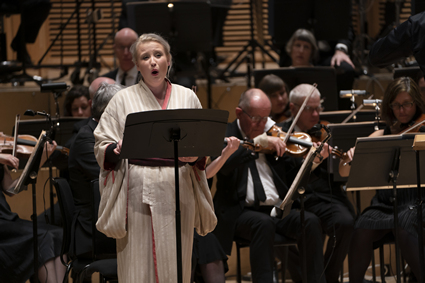| Opera Reviews | 19 April 2024 |
Mascagni's Iris well worth the effortby Catriona Graham |
|
| Mascagni: Iris
Scottish Opera December 2019 |
|

Kiandra Howarth (Iris)
|
|
|
The latest in Scottish Opera’s series of lesser-known Mascagni operas is Iris, a highly symbolic yet shockingly modern tale set in Japan. In outline, it is conventional – beautiful woman, desired by rich and powerful man who has her abducted. She rejects his advances, he rejects her, she is rejected by her family and kills herself from shame. The music is super – luscious, some very interesting harmonies and orchestration. There are lots of gongs and other percussion, and a mandolin stands in for the Japanese shamisen. Certainly, a concert performance does not distract one’s attention from the music the way a fully-staged performance might. On this occasion, the usual semi-staging had been abandoned because of the prevalence of seasonal ill-health during the rehearsal period and the last minute replacement of Iris herself. The soloists did, however, wear kimonos on stage. In order to abduct Iris for Prince Osaka, brothel-keeper Kyoto has set up a puppet-theatre performance in Iris’s home village, and Osaka plays the part of the sun god Jor. One of the geishas, Dhia, sings the story, which largely pre-figures Iris’s fate. Iris, who is very young and innocent, falls for Osaka’s voice and is separated from her blind father, and stolen away to the brothel in the Yoshiwara district of Edo (Tokyo). And so her fate is sealed. Kiandra Howarth makes Iris real. She may not sound like a young girl – Iris is still playing with her dolls – but her voice soars in the set-piece arias; when she prays in Act 1, in Act 2’s somewhat dubious narrative of the octopus and the girl, and in her glorious dying hymn to the sun in Act 3. Her incomprehension at the advances of Osaka and conviction that he really is Jor is genuine. Osaka himself is sung by Ric Furman. He’s not that bad, really, he is just very young and rich and entitled. In another opera, he would have tried to seduce Iris by pretending to be a peasant or something. Think teenage, not even twenties. Furman catches that perfectly, particularly the “I’m bored, I’m off” attitude when Iris rejects his advances. If anyone is evil, it is Kyoto, who gave up thieving because he was fed up being beaten, so he took up brothel-keeping and beats the girls instead. He knows exactly what he is doing, dresses Iris in diaphanous clothes and sticks her in a window to attract trade when Osaka storms off. Roland Wood makes this unpleasant character unpleasantly real. Iris’s blind father is misled – Kyoto had left money and a note from ‘Iris” so Il Cieco thinks she went voluntarily to Yoshiwara. He rejects her by throwing mud in her face as she is publicly exhibited by Kyoto, but when she is dying, he fears the future without her to take care of him. Conductor Stuart Stratford, in his introduction, said there was no repentance in this opera. Maybe not, but Il Cieco does at least see the implications of what has happened. James Creswell imbues the character with dignity even at his most self-pitying. Charlie Drummond sings Dhia, the geisha, and has a gorgeous song without words with gong and harp accompaniment. Rag picker Aled Hall has a great aria as the dying Iris is found in the open sewer. The chorus work is excellent and their two great invocations top and tail the action. The overture to Act 3 has particularly beautiful orchestral playing. It is certainly an opera worth hearing again.
|
|
| Text © Catriona Graham Photo © James Glossop |
|







